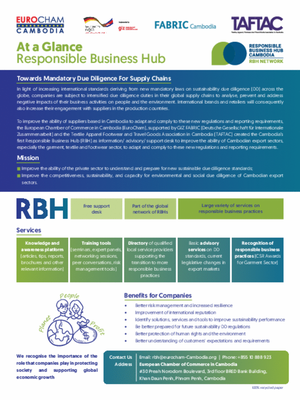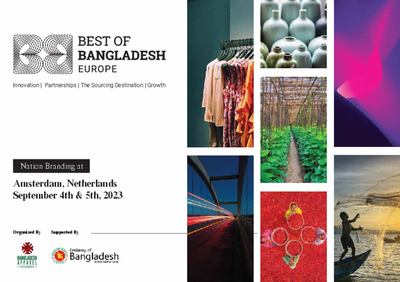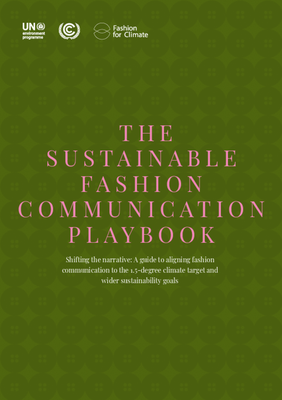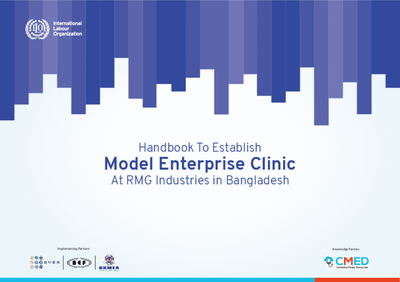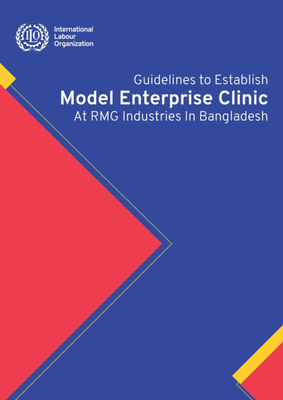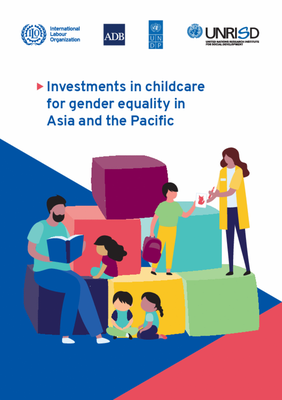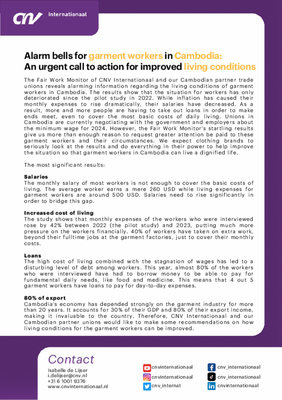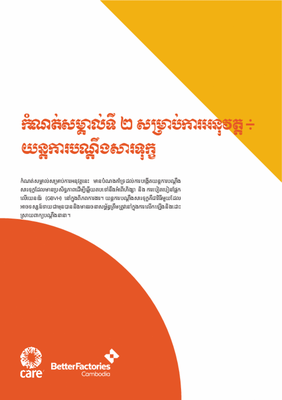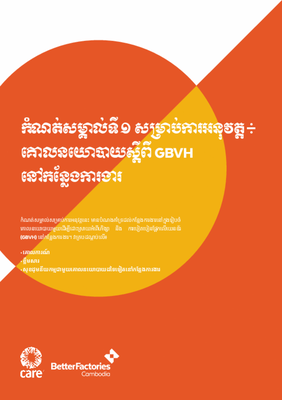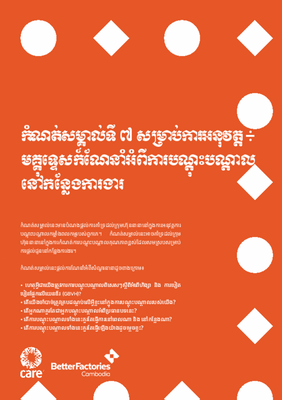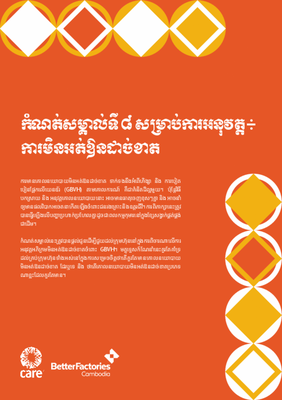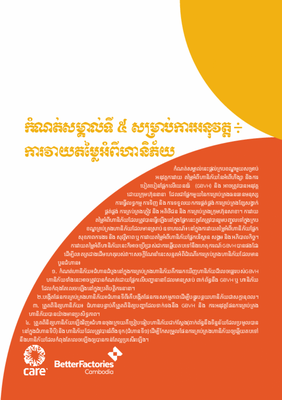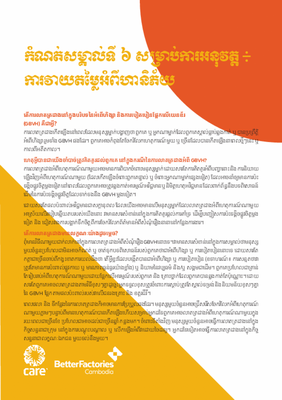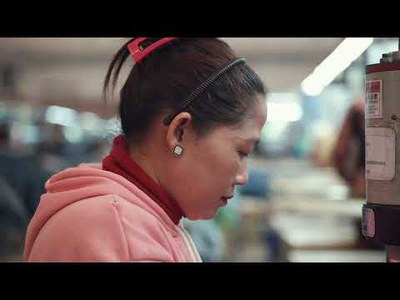
Third-party content disabled. Consent to activate.
How can we work together to ensure responsible digital wages payment?
How did the COVID-19 pandemic and better financial systems help many garment factories switch to paying their workers digitally instead of using cash? What are the advantages of this change for the factories, the workers, and the whole supply chain? In this video, you will hear...
View
 Better Factories Cambodia
|
May 08, 2023
Better Factories Cambodia
|
May 08, 2023
Factsheet: At a Glance Responsible Business Hub
The RBH is a service help desk for local businesses. It provides tailor-made, free of charge information and advisory services around sustainability and due diligence risk management which will ultimately link the gap between the national and international level actors in the...
View
|
Full View
|
Download
 Asia Garment Hub
|
May 23, 2023
Asia Garment Hub
|
May 23, 2023

Third-party content disabled. Consent to activate.
Best of Bangladesh Expo
The Best of Bangladesh will open the doors to international buyers, business partners, politicians, the art cognoscenti, press and the local community in Amsterdam, showcasing the best of what the Bangladesh industries and the Bangla culture have to offer, with a focus on...
View
|
Full View
|
Download
 GIZ FABRIC Asia
|
June 29, 2023
GIZ FABRIC Asia
|
June 29, 2023
Pictorial Handbook To Establish Model Enterprise Clinic At RMG Industries in Bangladesh
The International Labour Organization (ILO), in collaboration with the Ministry of Labour & Employment and Employers' Associations in Bangladesh, including BGMEA, BKMEA, and BEF, is working to establish effective Enterprise Clinics within factories. CMED Health as a knowledge...
View
|
Full View
|
Download
 International Labour Organization (ILO)
|
August 15, 2023
International Labour Organization (ILO)
|
August 15, 2023
Guidelines to Establish Model Enterprise Clinic at RMG Industries in Bangladesh
These Guidelines are based on the existing Government Regulations, i.e., Bangladesh Labour Rules 2015 and the stakeholder perspectives for establishing Model Enterprise Clinics in RMG factories. In following sections all important elements for Model Enteprise Clinics – as per...
View
|
Full View
|
Download
 International Labour Organization (ILO)
|
August 15, 2023
International Labour Organization (ILO)
|
August 15, 2023
Investments in childcare for gender equality in Asia and the Pacific
This is a study on the public provision of childcare across 48 economies in Asia and the Pacific through the lens of accessibility, affordability, quality, and decent work for childcare workers. Based on its findings, the study offers recommendations for increased investments in...
View
|
Full View
|
Download
 International Labour Organization (ILO)
|
August 15, 2023
International Labour Organization (ILO)
|
August 15, 2023

Third-party content disabled. Consent to activate.
Tutorial on using the Handbook to Establish Model Enterprise Clinics
This video provides business enterprises in Bangladesh with a step by step guide on how to establish clinics for their staff. It provides a checklist on government requirements and international standards for staff clinics. It is in Bangla with English Subtitles.
View
 ILO
|
September 06, 2023
ILO
|
September 06, 2023
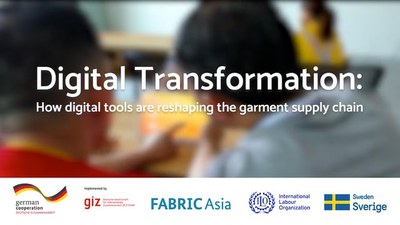
Third-party content disabled. Consent to activate.
Highlights from the webinar "How is COVID 19 changing the Digital Landscape for the Textile Industry"
This video features highlights from the webinar "How is COVID 19 changing the Digital Landscape for the Textile Industry", which is jointly organized by GIZ FABRIC and ILO’s Decent Work in Garment Supply Chains Asia project. In this webinar you will hear about two digital...
View
 Asia Garment Hub
|
January 05, 2022
Asia Garment Hub
|
January 05, 2022
Care & Better Factories Cambodia - Guidance Note 2: Grievance Mechanisms in Khmer
This guidance note is intended to support the design of effective grievance mechanisms in response to gender-based violence and harassment (GBVH) in the world of work. A grievance mechanism is a predictable and structured way to address and resolve complaints.
View
|
Full View
|
Download
 Asia Garment Hub
|
January 10, 2022
Asia Garment Hub
|
January 10, 2022
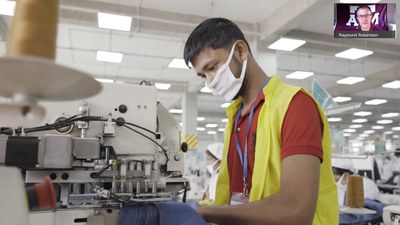
Third-party content disabled. Consent to activate.
Highlights from the webinar "Business Resilience - How can factories bounce back from COVID-19"
This video features highlights from the webinar "Business Resilience - How can factories bounce back from COVID-19", co-organized by GIZ FABRIC and ILO’s Decent Work in Garment Supply Chains Asia project. It looks at business resilience in the crisis and what small and large...
View
 Asia Garment Hub
|
January 05, 2022
Asia Garment Hub
|
January 05, 2022
Care & Better Factories Cambodia - Guidance Note 1: Workplace Policy on Gender-Based Violence and Harassment in Khmer
This guidance note is intended to support workplaces in designing a policy to address gender-based violence and harassment (GBVH) in the workplace. It covers: • Principles • Content • Harmonisation with other workplace policies
View
|
Full View
|
Download
 Asia Garment Hub
|
January 10, 2022
Asia Garment Hub
|
January 10, 2022
Care & Better Factories Cambodia - Guidance Note 7: Guide to Workplace Training in Khmer
This note is intended to support companies undertaking training of their workforce. The note may support companies in identifying suitable high-quality training to provide in the workplace. The note gives guidance on the following questions: Why do we need specific trainings on...
View
|
Full View
|
Download
 Asia Garment Hub
|
January 10, 2022
Asia Garment Hub
|
January 10, 2022
Care & Better Factories Cambodia - Guidance Note 8: Zero Tolerance in Khmer
Having a zero-tolerance policy in relation to gender based violence and harassment (GBVH), in principle, is a good idea. However, how that policy is expressed and put into operation can have different outcomes and potentially lead to unintended consequences for victims and...
View
|
Full View
|
Download
 Asia Garment Hub
|
January 10, 2022
Asia Garment Hub
|
January 10, 2022
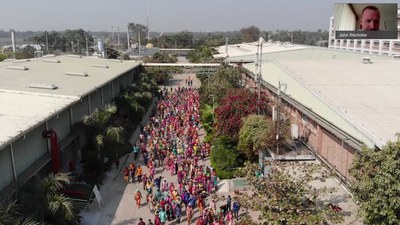
Third-party content disabled. Consent to activate.
Highlights from the webinar "How can Social Dialogue help us get through the crisis together"
This video features highlights from the webinar "Getting through the crisis together" - an online seminar series by GIZ FABRIC, which is jointly organized by GIZ FABRIC and ILO’s Decent Work in Garment Supply Chains Asia project. The webinar will focus on social dialogue as a key...
View
 Asia Garment Hub
|
January 05, 2022
Asia Garment Hub
|
January 05, 2022
Care & Better Factories Cambodia - Guidance Note 5: Risk Assessment in Khmer
This note provides a framework for undertaking risk assessments on gender-based violence and harassment (GBVH) and can be implemented by companies as part of human resource management, procurement, purchasing, and sourcing, supply chain management, client and customer management,...
View
|
Full View
|
Download
 Asia Garment Hub
|
January 10, 2022
Asia Garment Hub
|
January 10, 2022
Care & Better Factories Cambodia - Guidance Note 6: Responding to Disclosures in Khmer
What is disclosure in the context of gender-based violence and harassment (GBVH)? Why do we need to be sensitive in cases of GBVH disclosures? What does a disclosure look like? How do we respond to disclosures? What can I do? What can I not do?
View
|
Full View
|
Download
 Asia Garment Hub
|
January 10, 2022
Asia Garment Hub
|
January 10, 2022
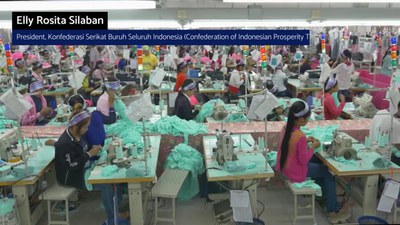
Third-party content disabled. Consent to activate.
Highlights from the webinar "COVID-19 and beyond - Making gender equality a reality"
This video features highlights from the webinar "COVID-19 and beyond - Making gender equality a reality", co-organized by GIZ FABRIC and ILO’s Decent Work in Garment Supply Chains Asia project. The webinar looks at the impact of the COVID-19 pandemic on workers in the textile and...
View
 Asia Garment Hub
|
January 05, 2022
Asia Garment Hub
|
January 05, 2022

